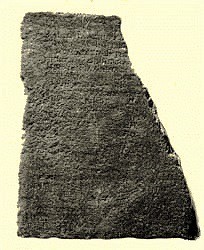‘Alī ibn al-Ḥusayn ibn ‘Alī al-‘Absī, known as IBN KAWJAK AL-WARRĀQ, was a gifted literary man who practiced the stationer's trade. In Egypt he studied under Abū Muslim Muḥammad ibn Aḥmad, secretary to the vizier Abū 'l-Faḍl ibn Ḥinzāba. His writings include The Book of Tambur-Players and The Book of Noblest Aspirations to the Highest Class, a book on asceticism addressed to al-Shābushtī, author of The Book of Monasteries. He died in Syria during the reign of al-Ḥākim, around the year 394 A.H. (= 1004 CE).
After the recapture of al-Ḥadath (in 953 CE) he said in praise of Sayf al-Dawla: (meter: khafīf):
He intended the destruction of Islam, but got his ears boxed
at al-Ḥadath. Its walls were the destruction of his error.
Since his powers were stripped from him at spear-point,
his soul shrinks from you. The weakling!
Fearing the ruin of his own life and property,
he traded his stay for a departure.
And now, up in those foothills, the birds and beasts
[of carrion] go hungry in their haunts.
How many times did you throw the birds a feast
on the skulls of his champions?
His father al-Ḥusayn ibn ‘Alī IBN KAWJAK was a poet and a literary man, of whom Abu 'l-Qāsim [Ibn ‘Asākir] al-Dimashqī says: Al-Ḥusayn ibn ‘Alī ibn Kawjak lectured in Tripoli in the year 359 (= 970), narrating hadith on the authority of his father ‘Alī, as well as Abū Mas‘ūd (secretary to [Ibn?] Ḥasnūn al-Maṣrī) and Abu 'l-Qāsim ibn al-Muntāb of Iraq, and some of the scholars kept a transcript of it. These verses are attributed to him (meter: ṭawīl):
Just after her husband's unexpected death
it turned out that his wife was pregnant.
Her family of origin was in a distant land,
and his would-be inheritors were at her on all sides.
But when the pregnancy came to light, they eased up
grudgingly, and crawled away like scorpions.
She came out with a newborn boy, and won the inheritance
of the dead father. And his relatives got no share.
When of age he came into the wealth, and the eyes
of buxom girls competed for their pleasure in him,
and he had gained the experience that leads to intelligence,
and his body had almost attained its full stature,
and he was desired and feared, and was desirous
of a beautiful life, and grew a beard and mustache,
[the embrace of] a chubby pair of arms behind a curtain
was predestined for him. He is bold and never timid against the foe.
[When he eats,] butcher-bones are all he leaves behind.
The locks of his noble dome are kept nice and short.
The most painful thing for me was the day
their saddled camels turned away,
their drivers taking them to Wādī Ghabā'ib.
Al-Muḥassin ibn al-Ḥusayn ibn ‘Alī IBN KAWJAK AL-ADĪB was a man of refinement. Best known as a stationer, he was also a poet. His handwriting, which resembles al-Ṭabarī's, was well known and much in demand. Al-Rūdhabārī says in the history he wrote in Egypt: "The scholar and stationer al-Muḥassin ibn al-Ḥusayn al-‘Absī died in the month of Shawwāl of the year 416 (= December 1025). He studied under Abū Muslim Muḥammad ibn Aḥmad, secretary to Ibn Ḥinzāba, together with his brother ‘Alī ibn al-Ḥusayn." Their aforementioned father was also a man of refinement.
I read in Ibn ‘Asākir's History of Damascus that "The scholar Abū ‘Abd Allāh al-Muḥassin ibn ‘Alī [sic] ibn Kawjak dictated short, aphoristic lectures in Sidon, some on the authority of Ibn Khalawayh. These teachings were memorized and transmitted by Abū Naṣr ibn Ṭallāb."
Ibn ‘Asākir said: I was told by ‘Abd Allāh ibn Aḥmad ibn ‘Umar that Ibn Ṭallāb said: "Our teacher al-Muḥassin ibn Kawjak dictated his teachings to us in Sidon, where I studied under him in the year 394 (= 1003-4). One of the poems he taught us was this" (meter: munsariḥ):
Your good looks are leaving you. They're on their way out,
when eyes roll and turn away from your [onetime] beauty.
You who used to slay others are now the slain.
You come back to life and find that it's moved on.
How many have noticed my affection for you, and my passion,
and had a talk with me, and called me a middle-aged [fool]?
May God have mercy on you, young man,
when young romantics start to call you "Sir."





